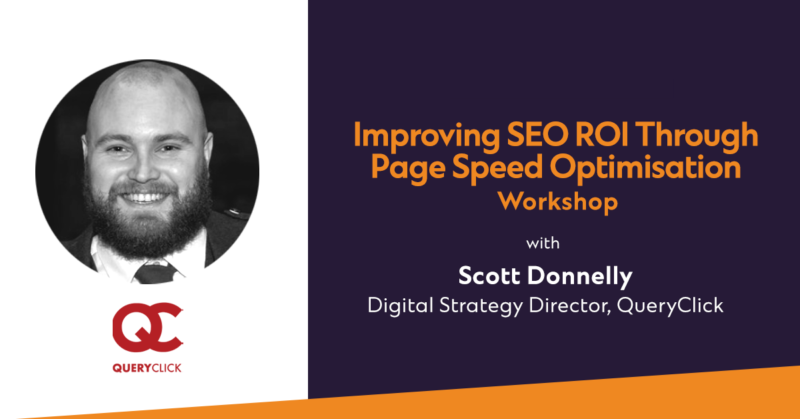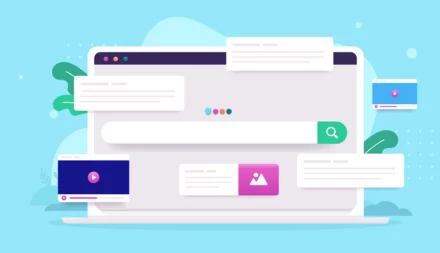How Page Speed Optimisation Can Improve ROI – A Masterclass Workshop

Last week we delivered an incredible triptych of presentations at Masterclassing’s Workshop Week. Our final presentation of came from Digital Strategy Director, Scott Donnelly, on the need for speed. More specifically, how ROI can be improved through page speed optimisation.
Read on for a quick re-cap of Scott’s presentation.
- Missed Malcolm Gibb’s session on reducing cannibalised budget wastage in paid search? Read all about it here.
Why page speed needs to be a focus
In his presentation, Scott highlighted marketer’s plans to shift budget from offline advertising to online promotion in 2021. That means more landing pages, more content and rich media, and ultimately greater demand on websites. Therefore, page speed will be vital for enabling and converting users.
Moreover, Scott highlighted two key factors that mean both marketers and developers MUST place more emphasis on enhancing page speed:
- A continued increase in mobile usage and site traffic – 82% of traffic to QueryClick’s ecommerce clients comes through mobile
- Google switching to a 100% mobile first index in March 2021
Therefore, to generate a positive ROI from marketing spend, brands must provide a good mobile experience. We’ve already seen the start of the page speed wars in 2020, so this will be crucial for generating a good performance in 2021.
Page speed impact on performance
When it comes to generating strong SEO results, page speed is already critical. Scott highlighted this with an example from some of the work we’ve been doing with one of our clients:
- Between February and August 2020, we reduced time to interaction by an average of 2 seconds on our client’s site
- This led to non-brand keyword rankings improving by an average of more than 5 positions
- Ultimately, it generated a 121% YoY increase in transactions.
In the presentation, it was spelled out in black and white; page speed will help you get better rankings, more traffic, improve your UX and conversions rates, enhance PPC quality scores and therefore allow you to grow revenue.
Sounds great, right?
How to improve page speed performance
Firstly, you have to think about how your website is built. Scott illustrated this point by using the analogy of it looking like a Ferrari but performing like an old Vauxhall Nova – just because a site looks sleek doesn’t mean it will perform well from an SEO or page speed perspective.
In fact, some of the elements of a site that make it most aesthetically pleasing are often the biggest culprits when it comes to hindering page speed performance.
Scott focused on three of the most common issues for slowing sites down:
- Videos and images
- Unrequired JavaScript
- 3rd Party Scripts
These are all features of effective sites but require close management to balance their contribution to performance with impact on page speed. Scott’s provided tips for managing these features:
- Videos and images – review file types and sizes as well as using lazy loads for content below the fold.
- JavaScript – avoid overuse, always ask if it is the best option when building new sections or features, and only use when necessary.
- 3rd party tools and scripts – audit your tag management system, remove legacy tags, and cull anything that isn’t adding value right now.
Applying this approach will enable you to satisfy the requirements of the search engines, particularly with Google’s introduction of Core Web Vitals.
Core Web Vitals will make up part of Google’s ranking algorithm from May 2021 and focus on the delivering a great experience for mobile users. The three key metrics that comprise Core Web Vitals are:
- Largest contentful paint (LCP) – the time to render the largest visible content element.
- First input delay (FID) – the time from a user first interacting with a page to when the browser responds.
- Cumulative layout shift (CLS) – the amount the page layout changes during loading..
As this will be an integral piece of the ranking algorithm, the need to work on improving performance in this area continually was stressed to the attendees.
Performance budgeting for page speed
“Performance budgeting is the process of setting a maximum file size or speed that webpages are not allowed to exceed”, explained Scott.
He went on to cover how they should not be set retrospectively, but as targets for development and marketing teams to work towards. Everyone needs to work together to achieve these, and once achieved performance against the budget KPIs should not decline. In fact, once KPIs are met, it takes a lot of effort and constant focus to maintain performance.
Creating reporting dashboards not only helps with ensuring performance is maintained or even improved further, it also supports in showing the ROI from such changes. They make it easier to see the impact over time and combined with other metrics allows stake holders from across your business to visualise the impact of this work on revenue.
Key takeaways
Those who attended the session were left in no doubts as to the importance of page speed and what can be done to improve it.
- The importance of page speed continues to rise and will be a critical success factor for brands in 2021.
- In fact, if your page speed isn’t up to scratch already, you’ll be losing out on revenue.
- To improve page speed performance, start with rigorous analysis of the impact of videos and images, non-essential JavaScript, and 3rd party scripts on your site.
- Introduce page speed budgeting to align efforts in improving performance and showcase ROI of this work.
Want help with your page speed?
- Test your mobile page speed to find out if you are already losing out on sales.
- Contact us to find out how are Technical SEO team can help you improve the speed of your site.
Own your marketing data & simplify your tech stack.
Have you read?
I have worked in SEO for 12+ years and I’ve seen the landscape shift a dozen times over. But the rollout of generative search engines (GSEs) feels like the biggest...
As you will have likely seen, last week Google released the March 2024 Core Algorithm Update. With it, comes a host of changes aiming to improve the quality of ranking...
After a year of seemingly constant Google core updates and the increasingly widespread usage of AI, the SEO landscape is changing more quickly than ever. With this rapid pace of...



